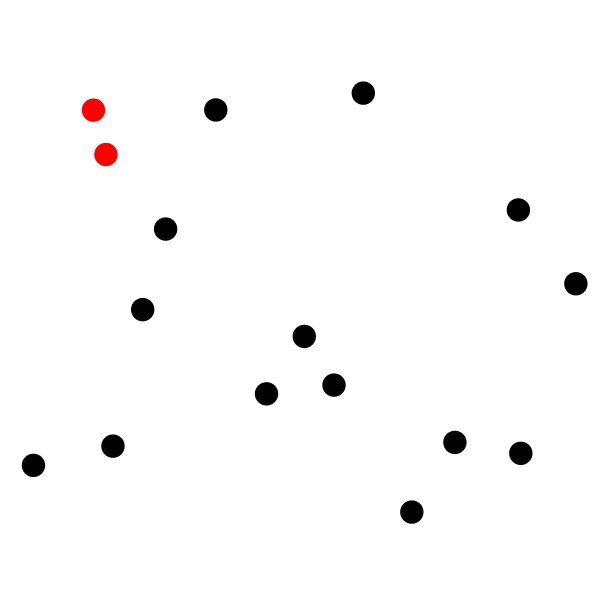Brute Force
The first algorithmic technique we’ll use is the brute force technique. This is the algorithmic technique that most of us are most familiar with, even if we don’t realize it.
Simply put, a brute force algorithm will try all possible solutions to the problem, only stopping when it finds one that is the actual solution. A great example of a brute force algorithm in action is plugging in a USB cable. Many times, we will try one way, and if that doesn’t work, flip it over and try the other. Likewise, if we have a large number of keys but are unsure which one fits in a particular lock, we can just try each key until one works. That’s the essence of the brute force approach to algorithmic design.
Example - Closest Pair
A great example of a brute force algorithm is finding the closest pair of points in a multidimensional space. This could be as simple as finding the two closest cities on a map, or the two closest stars in a galaxy.
To find the answer, a brute force approach would be to simply calculate the distance between each individual pair of points, and then keep track of the minimum distance found. A pseudocode version of this algorithm would be similar to the following.
MINIMUM = infinity
POINT1 = none
POINT2 = none
loop each POINTA in POINTS
loop each POINTB in POINTS
if POINTA != POINTB
DISTANCE = COMPUTE_DISTANCE(POINTA, POINTB)
if DISTANCE < MINIMUM
MINIMUM = DISTANCE
POINT1 = POINTA
POINT2 = POINTB
end if
end if
end loop
end loopLooking at this code, if we have $N$ points, it would take $N^2$ steps to solve the problem! That’s not very efficient, event for a small data set. However, the code itself is really simple, and it is guaranteed to find exactly the best answer, provided we have enough time and a powerful enough computer to run the program.
In the project for this module, we’ll implement a few different brute-force algorithms to solve simple problems. This will help us gain more experience with this particular technique.
-
File:Closest pair of points.svg. (2018, October 20). Wikimedia Commons, the free media repository. Retrieved 22:29, February 8, 2020 from https://commons.wikimedia.org/w/index.php?title=File:Closest_pair_of_points.svg&oldid=324759130. ↩︎
